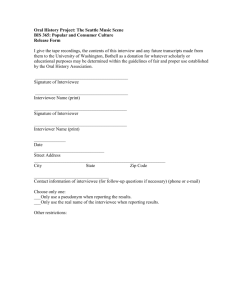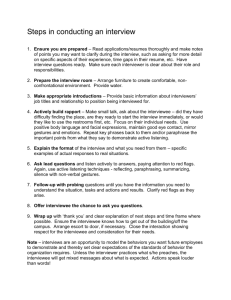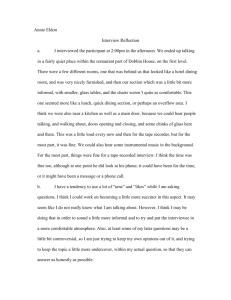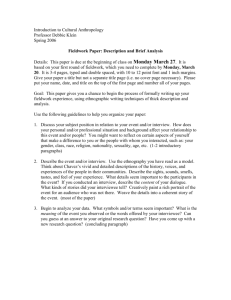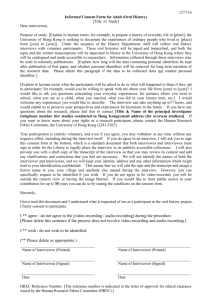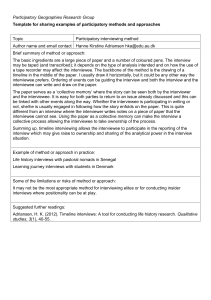STRATEGIES FOR INTERVIEWING
advertisement
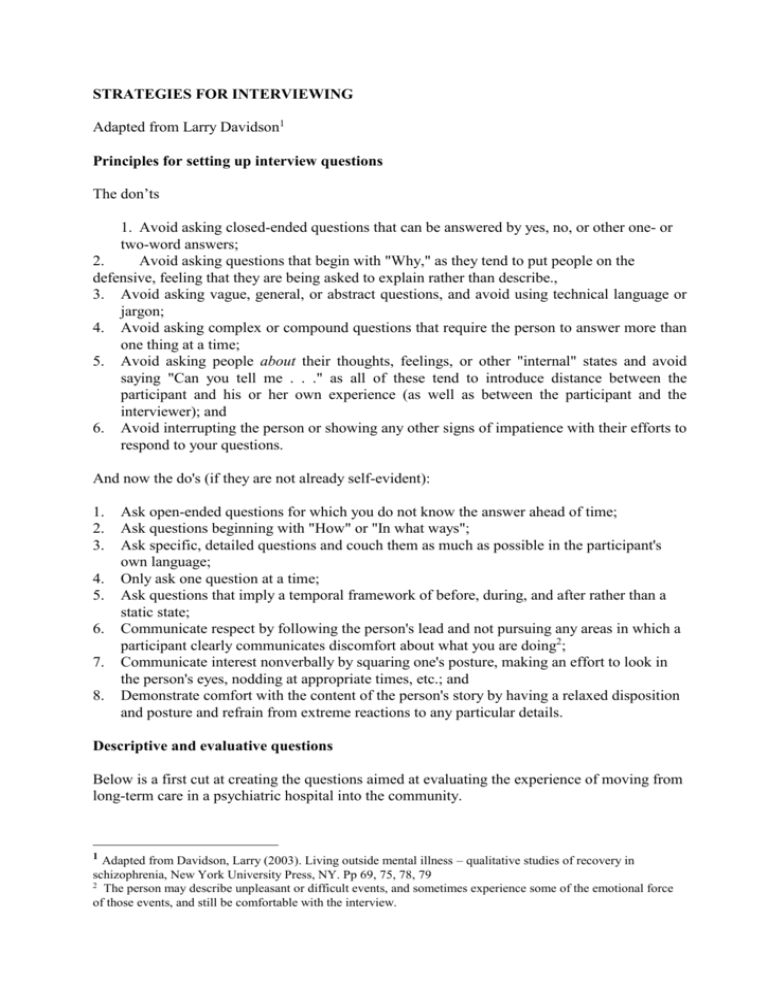
STRATEGIES FOR INTERVIEWING Adapted from Larry Davidson1 Principles for setting up interview questions The don’ts 1. Avoid asking closed-ended questions that can be answered by yes, no, or other one- or two-word answers; 2. Avoid asking questions that begin with "Why," as they tend to put people on the defensive, feeling that they are being asked to explain rather than describe., 3. Avoid asking vague, general, or abstract questions, and avoid using technical language or jargon; 4. Avoid asking complex or compound questions that require the person to answer more than one thing at a time; 5. Avoid asking people about their thoughts, feelings, or other "internal" states and avoid saying "Can you tell me . . ." as all of these tend to introduce distance between the participant and his or her own experience (as well as between the participant and the interviewer); and 6. Avoid interrupting the person or showing any other signs of impatience with their efforts to respond to your questions. And now the do's (if they are not already self-evident): 1. 2. 3. 4. 5. 6. 7. 8. Ask open-ended questions for which you do not know the answer ahead of time; Ask questions beginning with "How" or "In what ways"; Ask specific, detailed questions and couch them as much as possible in the participant's own language; Only ask one question at a time; Ask questions that imply a temporal framework of before, during, and after rather than a static state; Communicate respect by following the person's lead and not pursuing any areas in which a participant clearly communicates discomfort about what you are doing2; Communicate interest nonverbally by squaring one's posture, making an effort to look in the person's eyes, nodding at appropriate times, etc.; and Demonstrate comfort with the content of the person's story by having a relaxed disposition and posture and refrain from extreme reactions to any particular details. Descriptive and evaluative questions Below is a first cut at creating the questions aimed at evaluating the experience of moving from long-term care in a psychiatric hospital into the community. 1 Adapted from Davidson, Larry (2003). Living outside mental illness – qualitative studies of recovery in schizophrenia, New York University Press, NY. Pp 69, 75, 78, 79 2 The person may describe unpleasant or difficult events, and sometimes experience some of the emotional force of those events, and still be comfortable with the interview. 1. What was life like for you in the hospital, before you were discharged to New Haven? How did the transition of leaving the hospital and coming to New Haven for you? 2. How has it been for you to be living in New Haven since you were discharged from the [state hospital]? The principles behind the questions are that they are aimed at the experience of the interviewee. The evaluation of the benefits or otherwise of moving are picked up more by comparison of the experiences over time, and not necessarily by asking the participants to do the evaluation. The reasons for this are as follows: 1. Some interviewees may struggle with applying the concept of evaluation to macro-events. They may be able tell you about some things they like doing, but find it difficult to compare different stages in their life. 2. An interviewee’s evaluations will reflect the information that is available to them, so it is vital to first access the experiences on which the evaluations will be based. 3. An interviewee’s evaluations will be affected by contextual information – e.g. what they think that you (as the interviewer) want to hear, censoring internal voices, mood, events preceding the interview, time and place, etc, so they could be unreliable, untruthful or inaccessible. 4. Being required to make a judgement about one’s experience can be unpleasant, and interviewees may refuse to do it, or they may choose not to talk about some experiences if they know that they will have to judge them. So there are some topics where it may be distressing to ask for evaluations and others where it is not a problem. 5. Experience is subjective and evaluations of experience represent a second order of subjectivity. In qualitative research it is important that the reader can make their own evaluation of the interviewee’s experience. Getting more experiential depth In the first cut (above) at accessing experience, the questions may be too general and prompts may be needed to help interviewee’s access experience at a sufficient level of detail. The second cut (below) has questions and possible prompts. The prompts are only asked if information does not emerge during the answer to each question. Even here the interviewer will need to take care not to ask lists of questions, but to focus on the matters the emerge, seeking to deepen then and thus get to the heart of what life in the community is like. The second cut: A. In the community: First I'd like to find out what it has been like for you to be living in New Haven. How has it been for you since you were discharged from [the state hospital]? 1. How do you spend your time in New Haven? What kinds of things do you do during the day? How do you spend your evenings? How do you spend your weekends (particularly Friday and Saturday nights)? Do you go to any parties, dances, or other social events? Do you engage in any religious activities, by yourself or with others (e.g., go to church, synagogue, or mosque, pray or talk with God alone)? Do you celebrate any holidays? If so, how (where, with whom, etc.)? 2. What are your relationships with other people like? Do you have any friends? Do you see anybody from your family? Do you have any romantic relationships? How do people treat you in the community? How do you get your sexual needs met? Do you feel like a member of any group? 3. What is the community like? Are there any places in New Haven where you feel like you belong? Do you feel safe in the community? Are you able to buy the things you want or need? Are you able to get around as you would like? Do you get to use or do anything the community has to offer (movies, places to cat, etc.)? How do you take care of your daily needs (eating, doing laundry, etc.)? How do you feel about where you live? Do you get to do any of the things you used to enjoy, or that were important to you, before you went to the hospital (e.g., eat your favourite foods, get a good haircut, attend family events, etc.)? 4. Are there any things you miss about [the state hospital]? Particular people? Particular places? Particular activities or opportunities for work, school, or recreation? Feelings of being safe and taken care of 5. Has anything been particularly difficult for you since you were discharged from [the state hospital]? Symptoms or psychiatric problems? Have you felt more lonely or hopeless? Have you had any problems with your health? Has it been harder to get along day to day (e.g., eating or filling your time)? Has it been harder for you to see or talk with your doctor or other healthcare providers? 6. What kinds of successes or good experiences have you had since being discharged? What kinds of things do you like about the community? Do you get to do more or different things that you enjoy now that you are in the community? How do you feel about your ability to take care of yourself to the extent that you can? 7. What have you found most helpful in your adjustment to living in the community? 8. As you look toward the future, what are your hopes? 9. As you look toward the future, what are your fears? Creating a narrative order to the questions The questions need to have a flow to them that enable the story to be told in a way that suits the interviewee. Stories will often have a description that set the scene, followed by the establishment personality of the lead (the likes, needs and feelings of the interviewee). At some point tension and strong emotions will appear as the story moves to a climax, followed by resolution and a sense of the options that may emerge in the time to come. In the second cut above the questions begin in the present. The order of the questions will reflect a number of things: Easy descriptive questions. It is desirable to start off with questions that interviewees can respond to easily (describing the present, setting the scene – question 1), and do not demand judgements. Simple evaluations. Once the experience has been described, while still in the present, simple value judgements can be asked for (likes and needs – fleshing out the picture questions 2 and 3. Moving into more challenging areas. As trust is built, questions about unhappy, sensitive or possibly traumatic issues in the past get asked - question 4 looks at possible areas of loss or trauma. Major evaluations. These are asked for after the experiential ground work has been done. Questions 5 and 6 asks for a comparison between now and then. This is heart of the narrative. Solutions/resolutions. Finally we have solution/resolution oriented questions (7 to 9). Any research that examines issues of social justice needs to explore solutions and to complete the interview at a hopeful point. Other questions that may be needed at the end of an interview are: Confirming questions. If there are some key hypotheses that you are seeking to confirm simply and directly, these need top be asked after the experience has been fully laid out. Such a question might be around whether or not the person felt that deinstitutionalisation had improved their quality of life - “overall has your quality of life improved with your shift to New Haven?”. Demographic questions. What contexts have played an important influence in the answers to the questions. For example, is the person still receiving support from mental health services? How long were they in the psychiatric hospital? Where they live? Age, gender, culture, education and income are often important contextually. Much of this information will come out in the course of the interview, but a check needs to be made for any gaps before the interview is finished. A list of key demographic questions needs to be drawn up. Elaboration and allowing the interviewee to take charge of the narrative Davidson points out that rigidly following the interview framework can be the kiss of death for the interview. He stresses the need for the interviewer to have a high degree of curiosity about the answers given to the questions and seek elaboration where you are not clear about the meaning of what’s been said. The use of active listing techniques is helpful, but care must be taken not to put words into the interviewee’s mouth. He gives an example where an interviewee is talking about eating meals from a can in front TV, and not wanting to go to a restaurant because food “doesn’t taste the same as when you’re eating with somebody.” There is clearly more than the literal meaning of “taste” here. The interviewer reflects: “Doesn’t taste the same?” as an elaborating question and gets a full description of the interviewee’s loneliness. In another example when an interviewee was asked about participation in religious activities, she said, cryptically, “I don’t own a dress”. Because he wasn’t sure what this meant the interviewer said: “If you owned a dress would you go to church?”, to which the interviewee said she wouldn’t, and gave an more detailed response about how she met her spiritual needs. Getting interviewees to elaborate in this way shows that we are listening, that we are interested and that the interviewee is in charge of the narrative. We may not have to use our prompts because in their extended replies, we’re getting the information that we need. Letting the interviewee take charge of their story does not mean diverting into every little byway until you are miles away for the purpose of your interview. When you are sure you are getting off track, come back to your core questions and prompts and start again. Remember, that you need to cover the ground set by your interview schedule and that this needs to be done within the time that you and the interviewee are prepared to give to the interview.
